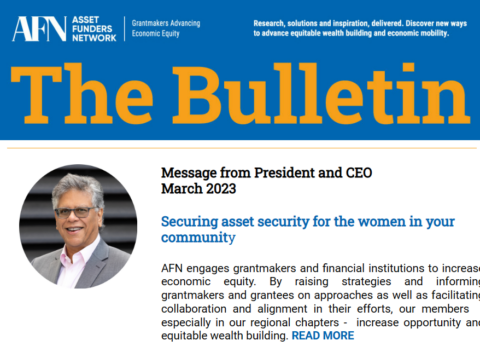D.C. Area: Advancing Racial & Gender Equity Through the Tax Code – Tax Credits & Beyond
How do tax policies and related programs intersect with racial, gender, and immigrant justice? How are states and localities building on tax credit successes and responding to the urgency of the tax changes brought on by the Tax Cuts and Jobs Act? How can philanthropy—funders focused on equity and those focused on economic mobility—work together to promote more inclusive and equitable tax policies that help build prosperity for all?
EITC Funders Network, the Asset Funders Network (AFN), Closing the Women’s Wealth Gap Initiative, Grantmakers Concerned with Immigrants and Refugees (GCIR), Grantmakers Income Security Taskforce (GIST), and the Philanthropic Initiative for Racial Equity (PRE) met at the 2018 Prosperity Summit for a unique funders-only opportunity to explore the linkages between the tax code and racial and gender equity. This convening contextualized state and federal tax policy shifts, provide lessons learned from the field, and fostered the opportunity for peer-to-peer learning, collaboration, and action planning.
WHEN
Thursday, September 6, 2018 from 2:00 PM to 5:00 PM EDT
WHERE
Gaylord National Resort and Convention Center
201 Waterfront Street
National Harbor, MD 20745
LEARN MORE
The tax code is one of the largest tools that the federal, state, and municipal governments have to provide families with economic security and wealth-building opportunities. Yet there is strong evidence that the tax code systematically disadvantages women, people of color, immigrants and low-income families.
Homeowners with home mortgages get tax breaks, but we know that people of color have been systematically left out of home ownership opportunities. High-income earners with retirement and other savings get tax breaks, but we know that women and people of color are more likely to be in jobs that do not pay enough or do not offer retirement savings opportunities.
Further, immigrant workers and families are increasingly excluded—either explicitly or implicitly—from these initiatives. These, and other tax code priorities, perpetuate the racial, ethnic and gender economic gaps that exist in the U.S. Federal tax legislation enacted last December cut taxes for those already at the top of the income spectrum, missing an opportunity to create more equitable wealth-building incentives.
In the wake of the new federal tax law, states and localities have the opportunity to further exacerbate these inequities or more importantly, promote economic security and mobility through expanding access to tax credits and other local and regional strategies that address institutional barriers. This meeting – open to foundation representatives and philanthropic advisers only – was offered free of charge, but meeting registration was required. Here is the full Prosperity Summit agenda for your reference.



